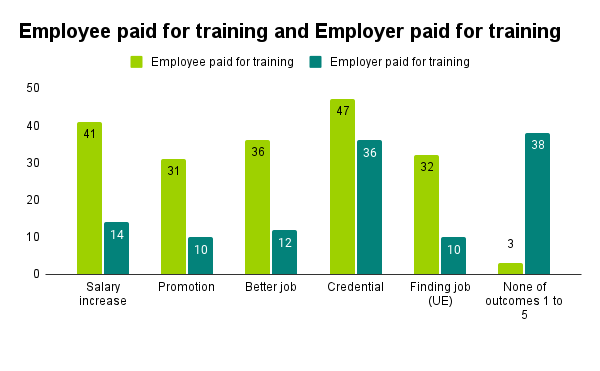Paying for skills training: Why employers need to act more strategically

At a time of rapid change in the workplace, access to skills training is key to workers’ success. Workers cannot expect that the knowledge and know-how they learned during their years in formal education will see them through their entire careers. And new research is casting doubts about how effectively employers in Canada are supporting their employees in their efforts to improve their skills.
The latest wave of the Survey on Employment and Skills finds that a majority of Canadians in the labour force (57%) took some form of skills training in the past year. But most of those workers who accessed training paid for it themselves. Only two in five said all the costs for training were covered by their employer (or someone else).
Looking at access to training and who pays for it, we get the following snapshot of the workforce: The largest group (43%) has had no skills training in the past year; the second-largest group (31%) participated in training but paid for it themselves; and the smallest group (24%) had training paid for by their employer.
This in and of itself might not be a problem, if the employer-funded training led to the best results. But the survey shows that employer-paid training is less likely to lead to concrete outcomes for employees, such as a raise, a promotion, or a new credential. In other words, the more likely it is that skills training leads to a positive material outcome for the worker, the more likely it is the worker paid for that training themselves.

A look at the types of training workers receive can help explain this pattern. The most common type is workplace health and safety, which is also one of the types of training most likely to be paid for by employers. This training is obviously essential, but is focused on ensuring worker well-being today rather than preparing for the jobs of tomorrow. Training focused on leadership, management or communication skills is less common, and also less likely to be paid for by employers. Not surprisingly, such types of training are also more strongly associated with positive outcomes such as a raise or a promotion.
Also concerning are the inequities associated with employer-paid training. Many groups that historically have faced barriers to advancement in the workplace, including workers who are racialized, Indigenous, or disabled, are actually more likely than average to have accessed skills training in the past year. And the training they took was more likely than average to lead to a positive outcome such as a promotion or a raise. That’s the good news. However, they were also much more likely to have covered the costs of the training themselves. As a result, racialized, Indigenous, and disabled workers in Canada are all much less likely than their white, non-Indigenous or non-disabled counterparts to have accessed training paid for by their employers. This suggests that the ways in which employers are choosing to invest in developing their employees’ skills may be reinforcing inequities in the workplace, rather than addressing them.
Taken together, the new survey findings suggest that employers should be thinking more strategically about the investments they are making in skills training. Previous studies had already shown that employers in Canada invest less in training to help improve workers’ skills than employers in other countries. Now, we can add to this concern that the investment that does occur may not always lead to better employment outcomes for employees, and may not always benefit those employees who need support the most. A more targeted use of the resources available for skills development could achieve better results for employers and employees alike.
The Survey on Employment and Skills is conducted by the Environics Institute for Survey Research, in partnership with the Future Skills Centre and the Diversity Institute at Toronto Metropolitan University. The sixth wave of the study consists of a survey of 5,968 Canadians age 18 and over, conducted between Oct. 13 and Nov. 23, 2023, in all provinces and territories. It was conducted both online (in the provinces) and by telephone (in the territories).
The Survey on Employment and Skills is funded primarily by the Government of Canada’s Future Skills Centre / Le sondage sur l’emploi et les compétences est financé principalement par le Centre des Compétences futures du gouvernement du Canada.
The views, thoughts and opinions expressed here are the author’s own and do not necessarily reflect the viewpoint, official policy or position of the Future Skills Centre or any of its staff members or consortium partners.




